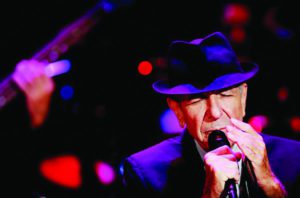NEW YORK — Leonard Cohen, the Canadian singer-songwriter whose Jewish-infused work became a soundtrack for melancholy, has died. He was 82.
“It is with profound sorrow we report that legendary poet, songwriter and artist Leonard Cohen has passed away,” his Facebook page said late Nov. 10. “We have lost one of music’s most revered and prolific visionaries.”
It did not give a cause of death. He was buried before the announcement of his death.
Cohen, a Montreal native born in 1934, was playing folk guitar by the time he was 15, when he learned the resistance song “The Partisan” while working at a camp from an older friend.
“We sang together every morning, going through The People’s Song Book from cover to cover,” he recalled in his first “Best Of” compilation in 1975. “I developed the curious notion that the Nazis were overthrown by music.”
As a student at McGill University, he became part of Montreal’s burgeoning alternative art scene, one bursting with nervous energy at a time that tensions between Quebec’s French and English speakers were coming to the fore.
His influences included Irving Layton, the Canadian Jewish poet who taught at McGill and, like Cohen, grappled with the tensions between the secular world and faith.
Cohen began to publish poetry and then novels, and was noticed by the national Canadian press. Moving to New York in the late 1960s — his song “Chelsea Hotel” is about his stay at that notorious refuge for the inspired, the insane and the indigent — he began to put his words to music.
“Suzanne,” was recorded by Judy Collins and became a hit, launching his career.
Cohen sang in his limited bass and wrote his songs so he could sing them. They would have been dirges but for their surprising lyrical turns and reckoning with joy in unexpected places.
In “Bird on the Wire,” one of his most covered songs, he recovers from a crippling guilt.
Cohen embraced Buddhism but never stopped saying he was Jewish. His music more often than not dealt directly not just with his faith but with his Jewish people’s story.
His most famous song, covered hundreds of times, is “Hallelujah” — he has said its unpublished verses are endless, but in its recorded version is about the sacred anguish felt by King David as he contemplates the beauty of the forbidden Bathsheba.
Cohen’s version, released in 1984, did well in Europe. John Cale recorded a piano-driven version for a Cohen tribute album in 1991. Jeff Buckley heard that version and used it as the basis for his own cover, reinterpreting on his guitar the arpeggios Cale had used to accompany the song.
Running longer than six minutes, Buckley’s version became the go-to song in the late 1990s for extended TV show montages depicting trauma and melancholy. Cale’s version was used in “Shrek” in 2001, and that did it: The song became inevitable.
“First We Take Manhattan,” recorded in the late 1980s when Cohen was living much of his time in Europe, plumbs the anger of a modern Jew traveling through a postwar consumerist Europe that has become adept at ignoring its Jewish ghosts.
Cohen was droll, but also reverent: Each of his explanations of his songs on 1975’s “Best Of” is sardonic except for one, for “Who by Fire.”
“This is based on a prayer recited on the Day of Atonement,” was all he wrote.
Cohen, in his 70s, again began to tour and record; a manager had bilked him of much of his fortune. He released his final album, “You Want It Darker,” last month.
He often toured Israel, and he expressed his love for the country — Cohen toured for troops in the 1973 Yom Kippur War — but he also expressed sadness at the militarism he encountered there.
Under pressure from the boycott Israel movement to cancel a 2009 concert, he instead donated its proceeds — much needed by him — to a group that advances dialogue between Palestinians and Jews.
Tickets to the stadium at Ramat Gan sold out in minutes. His Israeli fans embraced him that September night, and he returned the love, sprinkling the concert with Hebrew and readings from scripture and ending it with the priestly blessing.
In August he wrote an emotional letter to his muse Marianne Ihlen, who died in late July, suggesting he, too, was ready to embrace his death.
Last month, in a profile of Cohen in the New Yorker, Bob Dylan compared his fellow singer-songwriter to Irving Berlin — linking three iconic Jewish musicians in one poignant assessment.
Leonard Cohen was buried in his hometown of Montreal hours before his death was made public.
Cohen died Nov. 7 in Los Angeles and was buried Nov. 10 at his family’s plot in the Shaar Hashomayim cemetery, according to reports citing a statement from Congregation Shaar Hashomayim, an Orthodox synagogue in the Westmount neighborhood.
“Leonard’s wish was to be laid to rest in a traditional Jewish rite beside his parents, grandparents and great-grandparents,” the statement said. He maintained “a lifelong spiritual, musical, and familial connection to the synagogue of his youth.”
The Cohen family plot is located just through the front gates of the Jewish cemetery near the base of Mount Royal, the Toronto Star reported. The only evidence of Cohen’s burial is unsettled earth covered by fallen brown leaves in front of an unmarked gravestone, according to the newspaper.
“Hineni, hineni, My L-rd” and other lyrics to the song “You Want It Darker” from his latest album released in September were read during the traditional Jewish graveside funeral attended by family and close friends only, the French news agencyAFP reported.
Mourners have laid flowers and lit candles at the doorstep of Cohen’s Montreal home, the Globe and Mail reported. Montreal Mayor Denis Coderre reportedly has pledged to find an appropriate way to honor “one of our greatest Montrealers.”
“My father passed away peacefully at his home in Los Angeles with the knowledge that he had completed what he felt was one of his greatest records,” Cohen’s son, Adam, wrote in a Facebook post. “He was writing up until his last moments with his unique brand of humor.”
Cohen is also survived by a daughter.

















